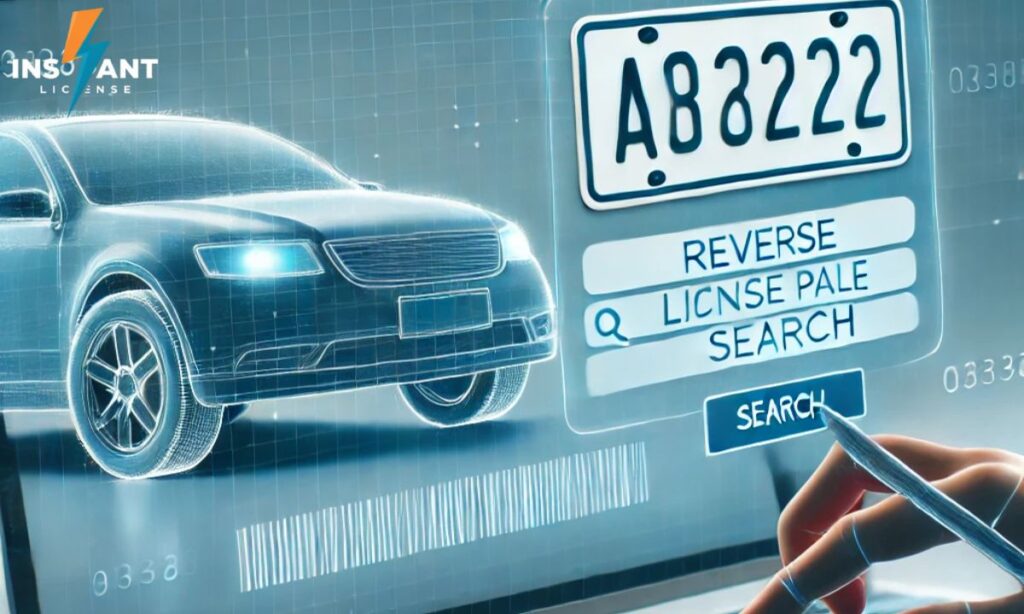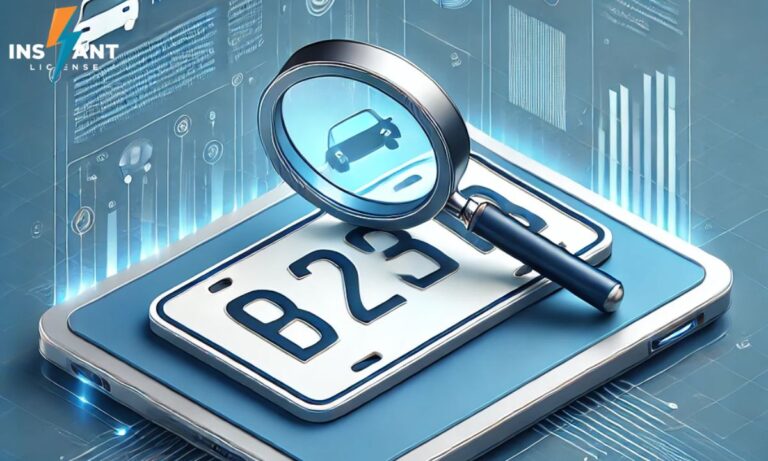Finding the owner of a vehicle through a license plate lookup can be challenging for average citizens. Most states restrict access to this information to protect privacy. Law enforcement agencies and approved businesses have legitimate access to these records.
Alternatives include hiring a private investigator or using public records that might indirectly connect plates to owners. Always ensure you’re pursuing this information for legal purposes, as misuse could violate privacy laws.
What Is a License Plate Lookup and How Does It Work?
A license plate lookup is a search process that connects vehicle registration numbers to ownership information. The system works by accessing databases maintained by state DMVs that link plates to registered owners. These databases store vehicle details, owner information, and registration status for all registered vehicles.
Vehicle identification numbers (VINs) are often used alongside license plate lookups to verify vehicle histories. Most legitimate license plate lookup services require proper authorization and documentation to comply with privacy laws.
Private citizens generally cannot perform a complete license plate lookup without legal justification. Government agencies, law enforcement, insurance companies, and certain businesses have authorized access to these records. When someone conducts a legal license plate lookup, the system retrieves information from secured government databases.
Is It Legal to Look Up a License Plate Owner?
The legality of looking up a license plate owner varies based on who’s searching and why. Most states strictly regulate access to DMV license plate lookup services following the Driver’s Privacy Protection Act (DPPA). This federal law limits who can access personal information from vehicle records. Law enforcement officers, insurance agents, private investigators, and attorneys typically have legal access to complete owner information.
For ordinary citizens, performing a license plate lookup to find vehicle owner information is generally restricted. Using DMV records or paid services without legitimate purposes could violate privacy laws. Some limited searches may be legal for specific situations like accident reporting or vehicle purchasing.
Free resources claiming to provide complete owner details often operate in legal gray areas or provide incomplete information. Before attempting any license plate lookup, understand your state’s specific regulations to avoid potential legal issues related to privacy violations.
Methods for Looking Up a License Plate Owner
Several methods exist for conducting a license plate lookup, each with varying degrees of accessibility and legality. Professional investigators often combine DMV license plate lookup resources with other databases to find comprehensive information.
Insurance companies maintain their own vehicle owner lookup systems that link to official records. Some attorneys can file legal requests to access license plate information for legitimate court cases.
Free options like public records searches rarely provide direct ownership details but might offer some vehicle information. Social media and community forums like Reddit sometimes discuss how to find vehicle owners by license plate free, though these methods are unreliable.
Vehicle history reports can provide ownership history without revealing the current owner’s personal details. Third-party services advertising “find someone’s license plate number by name” typically require payment and proper authorization to deliver valid results.
Using DMV Records for License Plate Searches
DMV license plate lookup services represent the most official channel for vehicle ownership information. Each state’s Department of Motor Vehicles maintains comprehensive databases linking license plates to registered owners.
These records contain vehicle specifications, registration status, and owner contact information. Accessing these records typically requires completing formal request forms and providing justification for the search.
The DMV restricts access to prevent misuse and protect privacy under federal regulations. Most states charge fees for license plate searches when conducted through official channels. Law enforcement can perform immediate license plate lookups during traffic stops or investigations.
Insurance companies partner with DMVs to verify coverage and ownership during claims processing. Private citizens cannot typically use DMV license plate lookup services without meeting specific exemption criteria like involvement in accidents or legal proceedings.
Read This Blog: How to Easily Remove Rusted License Plate Screws with Pliers
Online License Plate Lookup Services: Are They Reliable?
Online license plate lookup providers vary dramatically in reliability and legality. Legitimate services typically verify your identity and purpose before providing vehicle owner lookup information. Many websites promising to “look up license plate owner free” deliver incomplete or outdated data. These services often compile information from public records rather than accessing official DMV databases.
Paid services generally offer more detailed information but still face legal limitations on what they can disclose. Most reliable vehicle owner lookup services require subscription fees and proper documentation of purpose.
VIN owner lookup options sometimes provide more comprehensive vehicle histories than plate searches. Reviews and success rates for these services vary widely, with many customers reporting mixed results. Before paying for any online license plate lookup, research the company’s reputation and understand exactly what information they legally can provide.
How to Perform a Reverse License Plate Search

A reverse license plate search involves starting with a plate number to identify vehicle and owner details. Begin by determining if your situation qualifies for legitimate access under privacy protection laws. If eligible, contact your state’s DMV directly to request official license plate lookup documentation. Prepare to provide personal identification and a formal reason for your request.
Private investigators can perform professional searches when legal justification exists but cannot access records for curiosity. Some paid online services advertise the ability to “find vehicle owners by license plate free reddit” but rarely deliver complete information.
For accident-related searches, insurance companies and police reports often provide necessary details without privacy violations. VIN searches sometimes offer an alternative when plate searches are restricted. Remember that misrepresenting your purpose for conducting a license plate lookup can result in legal penalties.
What Information Can You Get from a License Plate Search?
License plate lookup services provide varying levels of information depending on authorization and purpose. Basic searches typically reveal the vehicle’s make, model, year, and sometimes color. More detailed reports may include registration status, previous accidents, and outstanding recalls. Vehicle history reports often show title transfers, odometer readings, and major damage reports.
For authorized users, comprehensive license plate lookup services can provide registered owner information. Insurance companies use these searches to verify coverage details and claims history. Law enforcement can access additional details like outstanding warrants or stolen vehicle status.
The most restricted information includes personal details like the owner’s address, phone number, and driving record. Public searches rarely provide direct ways to find someone’s license plate number by name without proper authorization.
Free vs. Paid License Plate Lookup Services: Which One to Use?
Free license plate lookup options generally provide limited information compared to paid services. Sites claiming to “look up license plate owner free” typically access only publicly available vehicle specifications. These free services cannot legally provide the owner’s personal information without authorization. Many free options use outdated databases or incomplete records, reducing reliability.
Paid services typically offer more comprehensive information but still must comply with privacy laws. Legitimate paid services verify your identity and purpose before providing vehicle owner lookup details.
Professional services used by investigators cost significantly more but provide deeper access when legally justified. The best approach combines multiple resources rather than relying on a single lookup service. Consider your specific needs and legal standing before deciding between free public information or authorized paid services.
Common Reasons for Looking Up a License Plate Owner
Several legitimate scenarios justify conducting a license plate lookup through proper channels. After traffic accidents, involved parties may need owner information for insurance claims. Property managers sometimes require vehicle identification for unauthorized parking violations. Potential used car buyers might verify ownership history before purchasing.
Law enforcement conducts license plate lookups during investigations of traffic violations and crimes. Insurance adjusters use DMV license plate lookup services to verify coverage during claims processing. Private investigators with proper authorization can search for specific vehicles in legal cases.
Some people attempt to find vehicle owners by license plate free reddit discussions, often seeking help with hit-and-run situations. Regardless of reason, always ensure your search follows legal guidelines and respects privacy regulations.
Read This Blog: How to Search a License Plate Number Legally & Easily
Protecting Your Privacy: Can Someone Look Up Your License Plate?
Understanding how others might access your vehicle information helps protect personal privacy. The Driver’s Privacy Protection Act limits who can legally perform a complete license plate lookup. Random strangers generally cannot obtain your personal details through legitimate channels. However, certain authorized entities like law enforcement and insurance companies maintain legal access.
Several steps can help protect your vehicle information from unwanted searches. Consider registering vehicles to a business entity rather than your personal name when possible. Maintain current registration and insurance to prevent additional scrutiny during routine checks. Be cautious about sharing vehicle details online where VIN owner lookup services might collect information.
If concerned about stalking or harassment, consult local law enforcement about additional privacy protections. Remember that while complete privacy is challenging, understanding the system helps you maintain reasonable control over your information.
Frequently Asked Questions
Can I look up who owns a vehicle by the license plate number for free?
No, completely free and legal services that reveal owner information don’t exist due to privacy laws.
Is it legal for me to look up someone’s personal information using their license plate?
Only if you have a legally permissible reason under the Driver’s Privacy Protection Act.
What information will a basic license plate search show me?
Vehicle make, model, year, and sometimes basic registration status without personal owner details.
How do law enforcement officers look up license plate information?
They use secured government databases that provide immediate access to owner and vehicle records.
Can I find out who owns a car that hit my vehicle and drove away?
Report to police who can legally perform the license plate lookup as part of their investigation.
Conclusion
License plate lookups remain a complex area where privacy concerns and legitimate needs frequently clash. The most reliable methods require proper authorization through official channels like DMV license plate lookup services or professional investigators. While online services promise easy access to vehicle owner information, they often deliver incomplete results or operate in questionable legal territory.
Ultimately, the balance between information access and privacy protection continues to evolve with changing regulations. Free options rarely provide complete owner details, while paid services require verification of legitimate purpose. When you need to identify a vehicle owner, start with legal channels like police reports, insurance companies, or official DMV requests.

Jimmy is an SEO expert specializing in license plates. He excels in content writing, keyword research, and web development, combining technical skills with creative strategies to deliver top-notch digital solutions.

